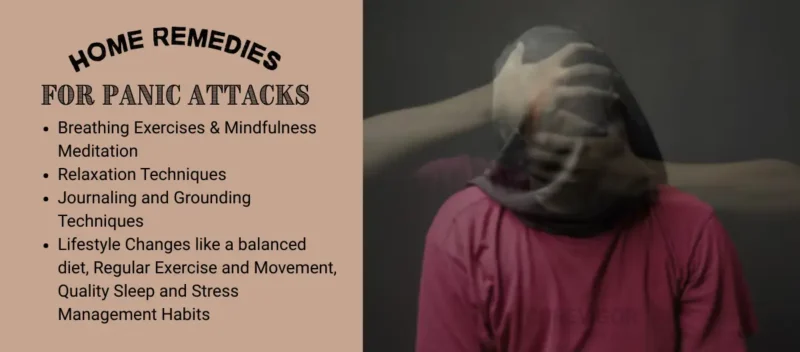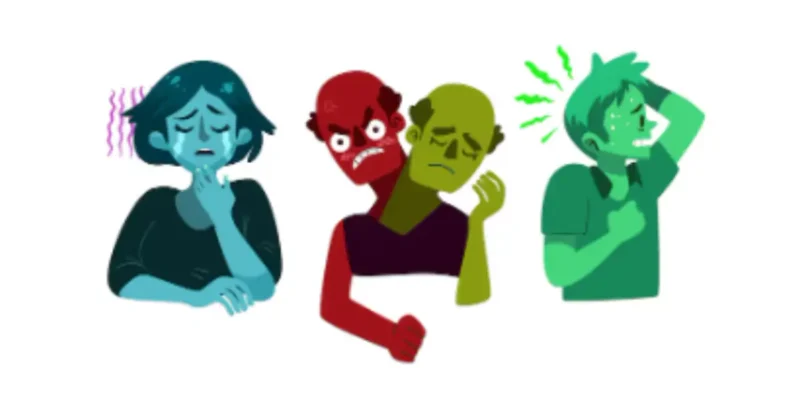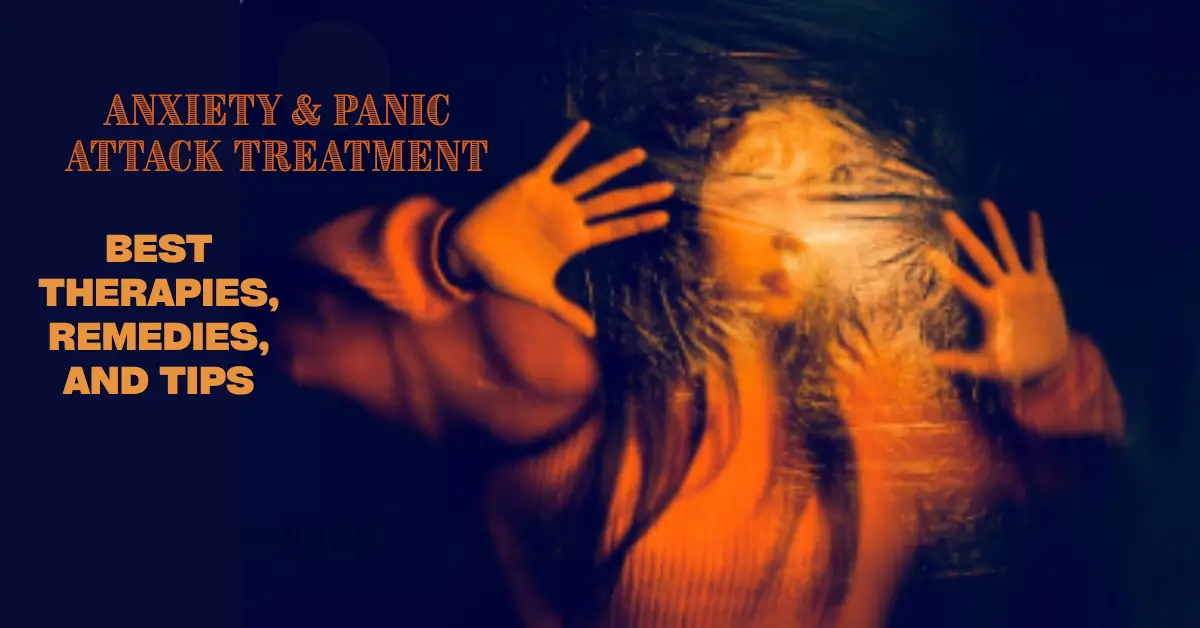Explore powerful anxiety and panic attacks treatment, including therapies, natural remedies, lifestyle strategies, and guidance on seeking help.
Thank you for reading this post, don't forget to subscribe!How to Treat Anxiety And Panic Attacks
Anxiety and panic attacks disrupt millions worldwide, ranking among the most prevalent mental health issues. While occasional stress is normal, chronic anxiety and abrupt panic episodes can undermine work, relationships, and well-being. Therefore, identifying the optimal treatment for anxiety and panic attacks is essential.
Therapy, natural remedies, and lifestyle changes offer practical ways to restore composure and command. The objective is not a quick “cure,” but effective symptom management and a more harmonious life. This guide outlines therapies, home remedies, and self-help techniques that have been proven to make a positive impact.
Understanding Anxiety and Panic Attacks
Before exploring anxiety and panic attack treatments, it’s vital to distinguish them. Anxiety is a persistent state of worry or unease, often triggered by daily stressors or underlying conditions like generalized anxiety disorder.
Abrupt spikes in extreme fear are known as panic attacks, and physical symptoms like perspiration, dyspnea, chest tightness, or an accelerated heartbeat frequently accompany them.

Many confuse anxiety attacks with panic attacks, but these differ. Anxiety gradually escalates, while panic attacks erupt suddenly and peak within minutes. Typical triggers include severe stress, excessive caffeine, sleep deprivation, or specific phobias. Distinguishing between them informs effective management.
Professional Therapies for Anxiety and Panic Attacks
One of the most effective paths for anxiety and panic attack treatment is professional therapy. Cognitive behavioral therapy (CBT) is an evidence-based method that helps people recognize and replace unhealthy thought patterns with more constructive ones. Because it provides useful coping mechanisms to stop or lessen attacks, cognitive behavioral therapy (CBT) is helpful for people with panic disorder.
Other therapeutic methods include exposure therapy, where individuals safely face their fears in a controlled environment, and talk therapy, which provides emotional support and stress management tools. In today’s digital world, online therapy and counseling platforms also make professional help more accessible.
While therapy doesn’t provide an instant “cure,” it equips people with long-term strategies to manage anxiety and prevent recurring panic attacks. For many, combining therapy with lifestyle changes creates the best results.
Home Remedies for Panic Attacks & Anxiety Relief
Natural and home remedies can support anxiety and panic treatments. They can help reduce symptoms and enhance coping, but should not be used as a substitute for expert care.

Breathing Exercises & Mindfulness Meditation
Deep breathing techniques assist in lessening the physical symptoms of panic attacks by controlling the neurological system. Simple methods, such as box breathing (inhale for 4 counts, hold for 4, exhale for 4, hold for 4), can quickly lower stress levels. It has also been demonstrated that mindfulness meditation, which focuses on the here and now without passing judgment, lowers anxiety and stops racing thoughts.
Relaxation Techniques (Yoga, Progressive Muscle Relaxation)
Yoga combines movement, breathing, and mindfulness, making it an excellent natural remedy for anxiety. Progressive Muscle Relaxation (PMR), where you tense and release different muscle groups, can help release physical tension linked to stress and panic. These relaxation methods can be practiced daily to build resilience against sudden anxiety spikes.
Journaling and Grounding Techniques
Writing down worries in a journal helps organize thoughts and reduce mental clutter. Grounding exercises, such as naming five things you see or feel, can shift attention away from panic and bring focus back to the present moment. These simple techniques are easy to practice at home and often reduce the intensity of an attack.
Lifestyle Changes That Support Anxiety Treatment

Lifestyle choices support anxiety and panic attack treatment. Small daily changes can strengthen the mind and body, leading to better stress and attack management.
Balanced Diet and Gut Health
Nutrition influences mood and mental health. Magnesium, B vitamins, and omega-3 fatty acids can improve brain function and reduce anxiety. Foods that contain probiotics, such as kefir and yogurt, support gut health, which is directly related to emotional wellness via the gut-brain axis.
Regular Exercise and Movement
Endorphins are naturally occurring mood enhancers that are released during exercise. A 20-minute stroll can improve sleep quality and dramatically reduce stress chemicals. Exercise also helps ease tense muscles and teaches the body to better manage adrenaline in those who experience panic episodes.
Quality Sleep and Stress Management Habits
Poor sleep often makes anxiety worse. Creating a sleep-friendly routine—such as limiting caffeine, reducing screen time before bed, and practicing relaxation techniques—helps restore balance. Stress management habits like time management, healthy boundaries, and regular breaks at work also prevent burnout, which is a major anxiety trigger.
Alternative & Complementary Approaches
Alternative and complementary methods may support anxiety and panic treatment. Though not substitutes for professional help, they can bring comfort and well-being.
Herbal Teas and Supplements (Chamomile, Ashwagandha, Magnesium)
Herbal remedies are among the oldest natural aids for anxiety relief. Chamomile tea, for instance, is renowned for its calming properties and is often consumed as a bedtime aid. Ashwagandha, an adaptogenic herb, may help the body better manage stress.
Magnesium supplements are also linked to reduced nervous system overactivity, which can ease panic symptoms. Ask a healthcare provider before beginning any new supplement regimen.
Aromatherapy and Essential Oils
Aromatic compounds that promote relaxation and help mitigate stress include frankincense, bergamot, and lavender. They can be inhaled, added to a diffuser, or blended with carrier oils for massage. While aromatherapy alone isn’t a cure, it can complement anxiety and panic attack treatment by helping to calm the senses during stressful moments.
Music Therapy and Creative Outlets
Music has a powerful effect on emotions and brain chemistry. Slow, soothing tracks can reduce heart rate and promote relaxation during anxious times. Beyond music, other creative outlets such as painting, writing, or dancing provide healthy ways to process emotions and distract from negative thought patterns. Engaging in creativity is a simple yet effective way to promote mental health balance.
When to Seek Medical Help
Certain forms of anxiety and panic attacks necessitate expert medical care, even though lifestyle modifications and alternative cures can be beneficial. An effective treatment strategy for anxiety and panic attacks must include knowing when to get help.
Signs That You Need Professional Care
If panic attacks happen frequently, interfere with daily life, or lead to avoidance of everyday activities, it may be time to consult a professional. Other warning signs include constant worry, inability to relax, or physical symptoms such as chest pain and dizziness that mimic heart problems.
Importance of Accurate Diagnosis
Anxiety disorders can sometimes be mistaken for other health issues, so getting a proper diagnosis ensures the right treatment path. A licensed therapist or psychiatrist can identify whether symptoms are linked to generalized anxiety disorder, panic disorder, or another mental health condition.
Medication Overview (SSRIs, Anti-Anxiety Meds)
For some individuals, therapy alone may not be enough. Doctors may prescribe medications like SSRIs (selective serotonin reuptake inhibitors) or short-term anti-anxiety medicines to stabilize mood and reduce attack frequency. These are always specified and monitored by healthcare professionals, so self-medicating is not recommended.
Seeking medical help is not a sign of weakness—it’s a step toward recovery and stability. Take that first step and reach out for help if you relate to the signs above. Combining professional treatment with healthy lifestyle habits often brings the best results. Start today, and take control of your well-being.
FAQs
Q. What is the best treatment for panic attacks?
The best anxiety and panic attack treatment depends on the individual. Although specialists may also suggest lifestyle modifications, natural therapies, and, in certain situations, medication, cognitive behavioral therapy (CBT) is thought to be quite successful.
Q. Can anxiety be cured naturally?
While there isn’t a one-size-fits-all cure, many people find relief through natural remedies such as breathing exercises, mindfulness, herbal teas, and yoga. These methods can significantly reduce symptoms, especially when combined with professional support.
Q. How long do panic attacks usually last?
The majority of panic episodes peak within ten minutes and usually last twenty to thirty minutes. However, lingering anxiety symptoms may last longer. Learning grounding and breathing techniques can shorten the duration and make them easier to manage.
Q. What foods help with anxiety relief?
Foods rich in magnesium, omega-3 fatty acids, and B vitamins—such as leafy greens, salmon, and nuts—may support emotional balance. Probiotics from yogurt or kefir also support gut-brain health, which is linked to reduced anxiety.
Q. When should I see a doctor for anxiety?
If anxiety or panic attacks interfere with daily life, work, or relationships, it’s essential to seek medical advice. A physician or therapist can rule out additional health issues and offer a customized treatment plan.
Get more Health & Beauty Tips.
You might like to read:

